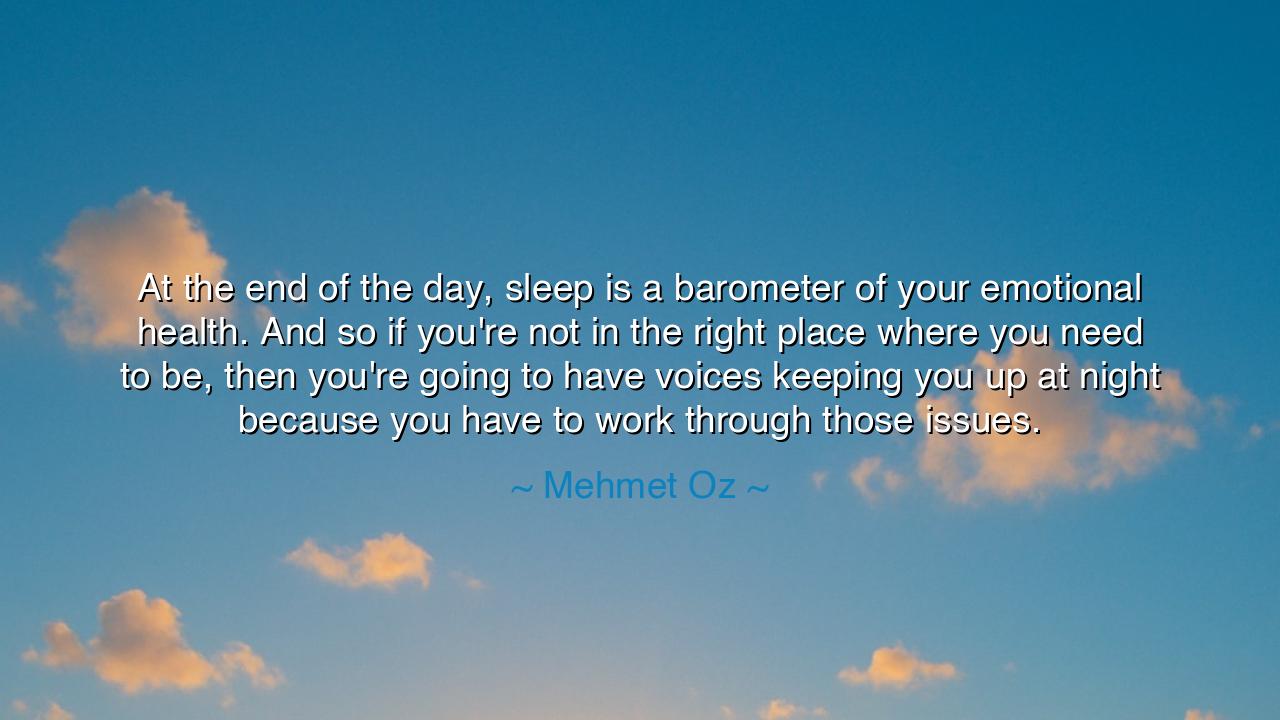
At the end of the day, sleep is a barometer of your emotional
At the end of the day, sleep is a barometer of your emotional health. And so if you're not in the right place where you need to be, then you're going to have voices keeping you up at night because you have to work through those issues.






The words of Mehmet Oz, “At the end of the day, sleep is a barometer of your emotional health. And so if you're not in the right place where you need to be, then you're going to have voices keeping you up at night because you have to work through those issues,” echo the timeless wisdom of the ancients dressed in the language of modern medicine. In them lies a truth as old as humankind itself: that the mind and body are not separate realms, but threads woven together into the same fabric of being. Sleep, that quiet mystery of renewal, reflects not only the state of the body but also the condition of the soul. When the heart is troubled, no bed can bring rest; when the spirit is calm, even the simplest place becomes a sanctuary.
The origin of this quote lies in Dr. Oz’s lifelong exploration of health as a union between the physical, emotional, and spiritual dimensions of life. As a surgeon, he has seen how fear, guilt, anxiety, and unhealed pain manifest in the body — how sleepless nights often whisper of deeper wounds. By calling sleep a barometer of emotional health, he reveals a truth hidden beneath modern busyness: that our nights are often shaped by what we refuse to face in the light of day. The “voices keeping you up at night” are not enemies; they are the conscience and the heart demanding reconciliation. They remind us that peace cannot be borrowed through pills or distractions — it must be earned through truth, reflection, and the courage to heal what is unresolved within.
In the style of the ancients, we might say that sleep is the mirror of the soul. The Greeks believed that Hypnos, the god of sleep, was the brother of Thanatos, the god of death — for both represent surrender. To sleep deeply is to trust life; to lie awake in turmoil is to fear it. When the mind is burdened by grief, anger, or regret, it resists surrender. It circles endlessly, wrestling with unseen demons. Thus, insomnia is not merely a failure of the body’s rhythm but a sign of spiritual imbalance. As Dr. Oz reminds us, the voices that disturb our rest are not punishments but invitations — to face the shadows we have buried, to make peace with ourselves, to find alignment between what we live and what we truly believe.
History offers powerful examples of this connection. Consider Abraham Lincoln, who in the years of the American Civil War, often endured long nights without sleep. His personal secretary, John Hay, once described how Lincoln would pace through the halls, sleepless and solemn, burdened by the weight of the nation’s suffering. It was not illness that robbed him of rest, but the agony of conscience and compassion. His insomnia was the mark of a heart that could not look away from the wounds of the world. Yet from those wakeful nights came the clarity and strength that shaped his greatest acts of leadership. In this, we see Dr. Oz’s truth made flesh: the sleepless mind is a mind at work upon the soul’s unfinished business.
Sleep, then, is both a healer and a messenger. When it deserts us, it is not cruelty, but communication. It tells us that something within us seeks acknowledgment — perhaps sorrow unspoken, forgiveness ungranted, or dreams long denied. The wise do not fight against sleeplessness with force alone; they listen to it. The restless night becomes a teacher, revealing the inner storms we must calm to restore harmony. In this way, the path to restoration begins not in the body but in the heart. When emotional wounds are tended, sleep returns as naturally as the tide returning to shore.
Dr. Oz’s insight carries an urgent lesson for our age, where exhaustion is worn as a badge of honor and silence has been replaced by constant noise. We run from reflection, fearing what the quiet might reveal. But no matter how fast we move, the truth follows us into the night. The “voices” he speaks of — our regrets, doubts, and unresolved emotions — will not be silenced until they are heard. To heal, one must stop running, sit in stillness, and meet oneself with honesty. Only then can the heart rest, and with it, the body too.
The lesson is clear and eternal: if you wish for peaceful sleep, first seek peace within. Do not numb your emotions; understand them. Do not drown your worries in distraction; resolve them. End each day with forgiveness — toward yourself and others — and gratitude for what remains. Reflect upon your thoughts before lying down, and let go of what cannot be carried into tomorrow. True rest comes not from exhaustion, but from alignment — when your inner world is at peace with your outer life.
So let these words of Mehmet Oz endure as a quiet teaching for all generations: sleep is not just a physical necessity, but a spiritual reflection. Guard it as you would guard your soul. When you cannot rest, do not despair — listen, reflect, reconcile. For every sleepless night carries the possibility of awakening — not of the body, but of the heart. And when the heart is whole again, sleep will return, not as escape, but as the gentle embrace of peace itself.






AAdministratorAdministrator
Welcome, honored guests. Please leave a comment, we will respond soon